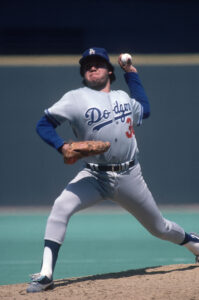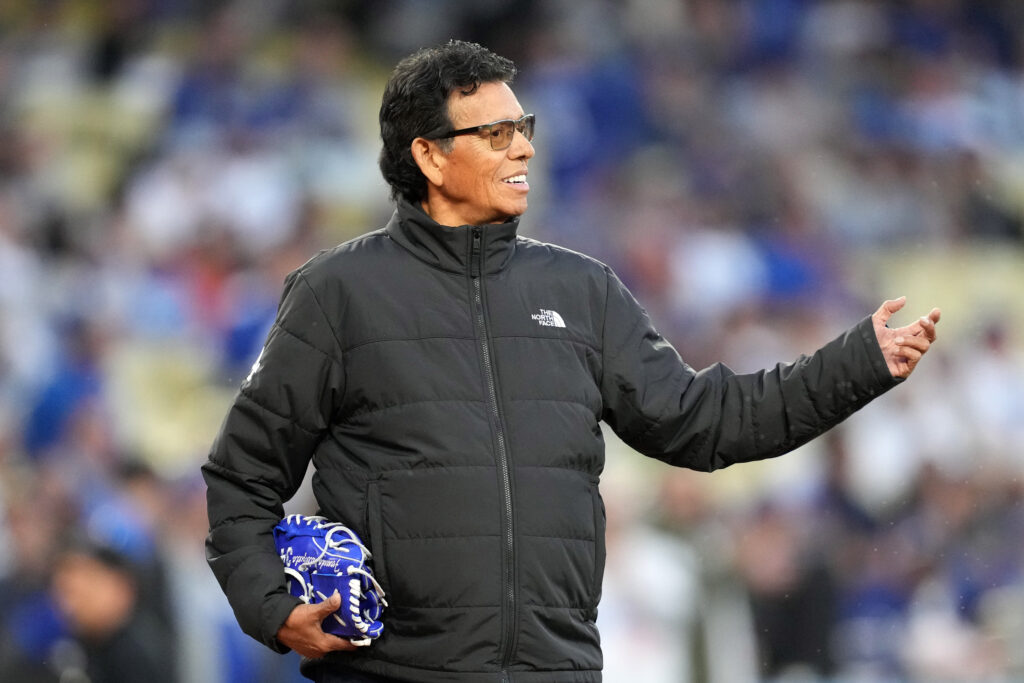Fernando Valenzuela passed away on Tuesday evening, a little more than a week shy of his 64th birthday. Major League Baseball will honor his memory with the World Series beginning at Dodger Stadium this weekend.
“On behalf of the Dodger organization, we profoundly mourn the passing of Fernando,” team president and CEO Stan Kasten said in a statement. “He is one of the most influential Dodgers ever and belongs on the Mount Rushmore of franchise heroes. He galvanized the fan base with the Fernandomania season of 1981 and has remained close to our hearts ever since, not only as a player but also as a broadcaster. He has left us all too soon. Our deepest condolences go out to his wife Linda and his family.”
Commissioner Rob Manfred released a statement of his own. “Fernando Valenzuela was one of the most impactful players of his generation. With his distinctive pitching style, the Dodger left-hander’s rookie season generated so much excitement in the U.S. and his native Mexico that it became commonly referred to as ‘Fernandomania.’ His 1981 season ranks among the most decorated pitching years of all-time as Fernando was the National League Rookie of the Year, the NL Cy Young Award winner, a Silver Slugger, and a World Series Champion.”
As both Kasten and Manfred referenced, Valenzuela was best known for his electric rookie season. The Mexican-born hurler signed with the Dodgers in 1979. While he was just 18 at the time, it didn’t take long before he pitched his way to Dodger Stadium. Valenzuela made all of 30 appearances in the minor leagues before making his MLB debut as a September call-up in 1980. Pitching out of the bullpen, the 19-year-old fired 17 2/3 innings without allowing an earned run to close the season. It was a preview of the phenomenon to come.
The Dodgers tabbed Valenzuela as their Opening Day starter in 1981 after Jerry Reuss suffered an injury. Valenzuela tossed a five-hit shutout against the Astros in his first career start. He followed up with a 10-strikeout complete game in a 7-1 victory over the Giants. He’d rattle off three straight shutouts thereafter, recording two more double-digit strikeout performances in the process. He closed out April with a 5-0 record and one run allowed in 45 innings.
Valenzuela’s shutout streak was snapped when he “merely” threw a one-run complete game win over the Expos during his first appearance of May. He blanked the Mets with 11 strikeouts in his next appearance, then tossed another complete game win (this time with two earned runs) against Montreal. Valenzuela completed and won each of his first eight big league starts while running a cumulative 0.50 earned run average — all at age 20.


That sheer dominance, which came on the back of a wiffle ball-style screwball, was only a part of Valenzuela’s immense popularity. A young Mexican pitcher performing at an historic level in Southern California made him an icon among Latin American fans, in particular. Valenzuela’s rookie year quickly became the stuff of legend, and the “Fernandomania” moniker that it took on remains a key chapter in MLB history more than four decades later. It was a captivating performance the likes of which will probably never be seen again with teams keeping a much closer eye on young pitchers’ workloads.
Of course, Valenzuela’s career stretched well beyond those magical two months. His rookie year was interrupted by the player’s strike that stopped play between the middle of June and the second week of August. The Dodgers, who were 36-21 at the time of the work stoppage, were declared the first-half winners of the NL West title. They knocked off the second-half NL West champion Astros in a hastily implemented Division Series — the Wild Card wouldn’t be introduced until more than a decade later — before toppling Montreal in the NLCS.
That set up a World Series showdown with the Yankees. Los Angeles defeated New York in what had been the most recent Fall Classic matchup between the behemoths. Valenzuela got the win with a four-run complete game in Game 3, the first of four straight victories for the Dodgers after they dropped the first two in the Bronx.
It was an ideal ending to one of the greatest rookie seasons the game has ever seen. Valenzuela turned in a 2.48 ERA across an NL-leading 192 1/3 innings. His eight shutouts and 180 strikeouts both led all major league pitchers. He topped future Hall of Famer Tim Raines for Rookie of the Year and edged out two more legends — Tom Seaver and Steve Carlton — to win the Cy Young. He finished fifth in MVP balloting and picked up a Silver Slugger for good measure. Valenzuela tossed 40 2/3 innings of 2.21 ERA ball over his five postseason starts.
The rookie season was so exceptional that it necessarily represented the peak of his career. Yet that in no way diminishes what he achieved throughout the 1980s. The southpaw remained a force atop the L.A. rotation for most of the decade. Valenzuela made the All-Star team in each of his first six full seasons. He topped 250 innings every year between 1982-87.
He fired 285 innings of 2.87 ERA ball in his second year, tying for third in Cy Young balloting in the process. He’d earn two more top-five finishes in the middle of the decade — including a runner-up placement behind Mike Scott during an ’86 season in which he struck out 242 hitters and led the Senior Circuit with 21 wins. The Dodgers made the postseason in 1983 and ’85, losing in the NLCS both times. They returned to the World Series in 1988 and defeated the A’s in seven games. Valenzuela missed that series due to injury but collected a second ring after throwing 142 1/3 regular season innings.
Valenzuela remained with the Dodgers for another few seasons, but his production waned. The Dodgers moved on after he allowed an NL-most 104 earned runs in 1990. It wasn’t a good year overall, though Valenzuela had his final highlight in a Dodger uniform when he no-hit the Cardinals that June. He bounced around between the Mexican League and MLB for another few seasons, most notably spending three years with the Padres. He made one final trip to the postseason with San Diego in 1996 and finished his MLB playing career the following season. Valenzuela made a brief return to the mound in his home country in the mid-2000s.
All told, he pitched in parts of 17 MLB seasons. Valenzuela suited up for six teams, though he’ll obviously be remembered most for his time in Dodger blue. He finished his career with a 3.54 ERA in nearly 3000 innings. He won 173 games, struck out more than 2000 hitters, and tossed 113 complete games (31 of which were shutouts). His rate stats, while still impressive, are diminished somewhat by his late-career struggles. During his 1981-86 peak, he turned in a 2.97 ERA with 1258 strikeouts and 84 complete games in exactly 200 regular season starts. He was also a solid hitter for a pitcher, running a career .200 average with 10 home runs while winning a pair of Silver Sluggers.
Valenzuela’s peak might have been Hall of Fame worthy, but he didn’t maintain it long enough to garner serious consideration from the BBWAA. He fell off the ballot in his second year of eligibility in 2004. Valenzuela was inducted into the Dodgers’ Ring of Honor. The franchise officially retired his #34 last year. He remained a key figure in the organization as a Spanish-language broadcaster through this season.
The news will cast a shadow over the upcoming World Series, though the Dodgers’ presence provides an opportunity for the organization to honor Valenzuela’s legacy on the biggest stage. MLBTR sends our condolences to his family, friends, former teammates and the countless fans whose lives he impacted.
Image courtesy of USA Today Sports.

